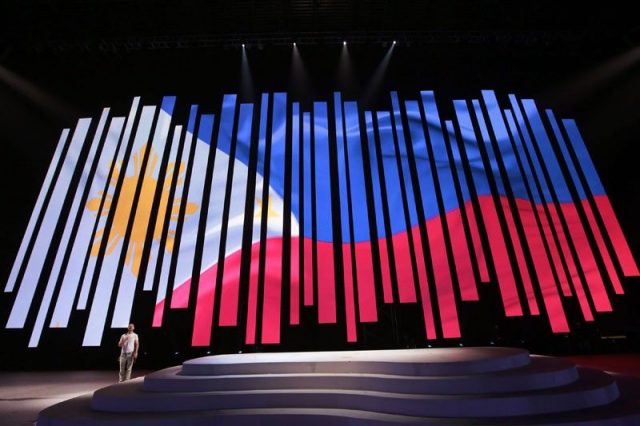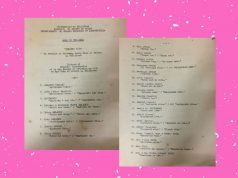
The term “Filipinx” suddenly trended on local Twitter last Monday after Filipinos discussed the purpose of its usage instead of the historically correct “Filipino” to represent the Philippines.
While it’s not commonly used among Filipinos in the country, Filipino-Americans overseas have been using the controversial term to refer to the Filipino members of the LGBTQ community living in the United States and other Western nations.
Some journalists in the US even use “Filipinx” to refer to Filipinos on social media. Lenika Cruz, a senior associate editor at The Atlantic, used Filipinx to address her Filipino followers on June 22.
“Filipinx friends, I made really good chicken adobo for dinner today, please clap,” she said.
filipinx friends, i made rly good chicken adobo for dinner today pls clap
— Lenika Cruz⁷ ✨ (@lenikacruz) June 22, 2020
It was unclear what triggered the online buzz on Filipinx.
Before the term landed on the top trending list of Twitter Philippines, Twitter user @cinemamuses posted a comic strip depicting a debate on the usage of “Filipinx.”
“To all the americanized filipinos who still use filipinx, TUMIGIL NGA KAYO. filipino is already a gender-neutral noun!!! get in touch with your roots rather than succumbing to western-centric views. pwede ba???” the Twitter user wrote.
to all the americanized filipinos who still use filipinx, TUMIGIL NGA KAYO. filipino is already a gender-neutral noun!!! get in touch with your roots rather than succumbing to western-centric views. pwede ba??? pic.twitter.com/PrjcOHfsq7
— donna (@cinemamuses) June 20, 2020
Days after, Filipinx landed on Twitter and the online user was surprised her post then gained traction.
i was kinda confused to see this getting attention because i posted this days ago pa hahaha. but i just saw that filipinx is trending today so i guess that’s why. anyway, FILIPINO IS GENDER-NEUTRAL PA RIN. pag gumagamit ka ng filipinx, panget ka lol sorry i don’t make the rules.
— donna (@cinemamuses) June 22, 2020
Meanwhile, most of the conversations on both the microblogging platform and Reddit Philippines included opposition on the usage of the term both online and offline.
They argued that the words “Filipino,” which refers to the nationality and the national language, and “Pilipino,” which refers to the residents, are already gender-neutral in the first place.
“Since when did ‘Filipinx’ became the gender-neutral term for ‘Pilipino’ when it’s already a gender-neutral term? No female calls themselves ‘Filipina’ as their nationality,” one Twitter user said.
The user also argued that the Filipino language doesn’t even offer “gender-specific pronouns.”
When addressing the third person point of view, Filipinos use “ikaw” regardless of the sexual orientation.
“Learn the vernaculars first and stop using us for your neutrality narrative. Our language has always been neutral for every sex/gender. Use Filipino/Pilipino. Stop using ‘Filipinx,’” the user said.
Since when did "Filipinx" became the gender-neutral term for "Pilipino" when it's already a gender-neutral term? No female calls themselves "Filipina" as their nationality 🤨 HOW COME THE WEST KEEPS ON REINVENTING WAYS TO CALL US WHEN OUR WHOLE LANGUAGE IS GENDER NEUTRAL ITSELF?
— 🚶♀️ (@heeniverse) June 22, 2020
Twitter user Charlie Sartre, meanwhile, perceived that Filipino-Americans in the United States might only be using the word to “distance” themselves to Filipino culture to sound quirky.
“When Fil-Ams use Filipinx, or Pacific Islanders, it’s like you keep distancing yourselves from a culture you only wanna be associated with when it sounds quirky. It’s also mind-boggling when you reject the notion ‘Filipino is a gender-neutral noun’ when it is,” the user said.
When Fil-Ams use Filipinx, or Pacific Islanders, it's like you keep distancing yourselves from a culture you only wanna be associated by when it sounds quirky. It's also mind boggling when you reject the notion 'Filipino is a gender neutral noun' when it is
— Charlie Sartre (@charlie_sartre) June 21, 2020
One Twitter user who introduced herself as a Filipino immigrant in the United States argued some Americans recognize Filipino/Filipina and Pinoy/Pinay as gender-conforming terms.
“Filipino/filipina and pinoy/pinay are recognized as gender-conforming terms (even though they aren’t) because that’s simply the society in the United States,” she said.
hi! recent immigrant from ph to us here and i DO NOT consider myself fil-am lol but i use filipinx. filipino/filipina & pinoy/pinay are recognized as gender conforming terms (even tho they aren’t) bc thats simply the society in the us. as a cis-female, i personally do not want +
— raine #BLM #OustDuterte (@rainegoes) June 22, 2020
Other online users, on the other hand, questioned the need for the debate on Filipinx, citing that the debate is “nuanced.”
this filipinx debate is making my head and my heart hurt. y’all truly don’t consider trans & nonbinary ppl at all huh. this isn’t about linguistics or “decolonization” for me right now. this is about y’all not listening to your own kababayan who are hurt by this dehumanization.
— anti imperialist club (@mujipenz) June 22, 2020
I’m so sick of the Filipinx debate… Guys just stop applying Hispanic gendered language standards onto an Austronesian genderless language. Yall so obssessed with looking woke when you don’t even have the decency to ask natives whether we use the term Filipina in legal documents
— lan juan is number huan #junkwenruohan (@moswanyu) June 23, 2020
1/n I identify as Filipinx. A thread.
There is a discussion in Twitterverse whether FilAms identifying themselves as Filipinx is detaching from our Filipino culture. The debate I think is more nuanced. I can only lean to my experience as Philippine-born of Chinese and Spanish
— Black Lives Matter 🏳️🌈🦄 (@miguelabgarcia) June 22, 2020
Why Filipinx?
A blog called Formation of a Filipino-American in June 2017 said that the term “Filipinx” came from a movement among Filipino immigrants who identify themselves as members of the LGBT community.
“The term Filipinx is born out of a movement to create space for and acknowledge genderqueer members of the Filipin* diaspora in the white-centric binary places their parents decide to move to (e.g. the United States). The term is also seen as a way to decolonize our colonized identity,” the page said.
The word itself, however, is also adapted from the “Latinx” society to refer to people in Latin America who are also members of the LGBTQ community.
Reddit users, meanwhile, viewed the “Filipinx” usage as a culture of Filipino-Americans in the US.


To end the confusion, one Twitter user suggested using “mamser,” a colloquial coined term from ma’am and sir, when addressing Filipinos on social media.
for my non-filo moots, please don't use "filipinx"
Filipinx
– heavily influenced by western ideas
– the "inx" sound doesn't even exist in our language lolFilipino/Filo
– already gender-neutral
– honestly sounds cooler!!!Mamser
– a better alternative
– funny and friendly— bell cranel 🌸🌸🌸 watching tower of god (@cranel_cutiepie) June 22, 2020









